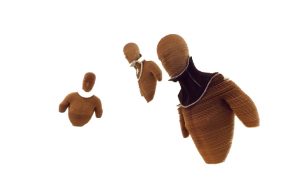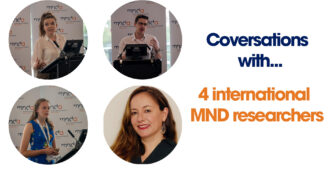 During the second day of the symposium Association-funded researcher, Dr Chris McDermott, presented his highly anticipated research on a new neck support for people living with MND.
During the second day of the symposium Association-funded researcher, Dr Chris McDermott, presented his highly anticipated research on a new neck support for people living with MND.
Our healthcare research aims to lead to better symptom management and support for people living with MND. We know that neck weakness is an extremely distressing problem in MND and it is very difficult as a clinician to treat this.
Dr Chris McDermott from the Sheffield Institute for Translational Neuroscience (SITraN) said that he wanted to address this problem by working with people living with MND to develop a solution.
Neck weakness
Current neck supports available are often restricted. This is because they are designed for other purposes (eg such as immobilising the necks of individuals after trauma). This means that people living with MND who experience neck weakness are left with the wrong tool for the job.
Our neck is designed to support our brain, and as humans we have developed a very large one of these. To put this into context, this means that our neck has to hold up the equivalent of 5Kg (or five bags of sugar)!
Dr McDermott highlighted that there are currently no specific neck supports available for people living with MND, stressing that there is a real need for this kind of support.

Patients, designers, clinicians and engineers
Dr McDermott said: “People living with MND asked us – can you do anything about this? So, we worked with local MND Association branches to design a neck support for people living with MND.”
After speaking to people living with MND the team decided that the device needed to support the neck, be customisable and adaptable for needs, as well as looking natural.
This saw people living with MND, clinicians, designers and engineers working together to try and develop a solution to the problem. Dr McDermott commented: “The advantage of designers is as you learn about problems, you can design out the problems.”
Dr McDermott said: “During the design process, we used hair curlers and everything in the beginning. My personal favourite, however, was the ‘Magneto neck concept’ – but we didn’t end up going with that one, or the R2D2 concept in the end!”
During the whole process, people living with MND were involved form the start. Trialling the neck supports and giving feedback to the team, such as what worked and what didn’t.
The Sheffield Support Snood
The end result was the ‘Sheffield Support Snood’ or ‘SSS’ for short. The team trialled the new neck support on 26 people living with MND, of which 20 completed the study.
During this process the team learnt a lot about different shapes of neck – something which is a unique and different as we all are.
Feedback from participants was that there was strong agreement that the Snood offered support, comfort and no pain compared to existing neck supports.
“I love the way you can adjust it in lots of different ways”
“It looks like an item of clothing and you can wear a scarf over it”
Final thoughts and what’s next?
Dr McDermott said: “Although there are many neck collars out there, most were designed for another purpose. These collars don’t work for people with MND. People take them home and they end up under the stairs gathering dust, rather than around someone’s neck. We worked with engineers, product designers, fashion designers and most importantly people living with MND to develop the new collar.”
The next challenge for Dr McDermott is to get someone to make this and take this on, which is difficult due to the relatively small market. However, Dr McDermott stated that he is in the process of discussing this with several companies.
After you’ve finished reading the symposium articles that interest you, we’d be grateful if you could spare a few minutes to fill in our short online survey on our symposium reporting. Your comments really are useful and will allow us to continually improve our symposium reporting https://www.surveymonkey.com/s/NBGZR5S






I have mnd and my neck muscles are weak I have tried a few collars but none of them are comfortable ,can you help!!
Dear Pam,
Thank you for your comment. We are sorry to hear about your troubles with neck collars. The Sheffield Support Snood is currently under discussions with companies to manufacture this product. If you email research@mndassociation.org we can help you in terms of current neck collars. We can also pass on your email to the researchers to find out approximate time lines for this device?
Kind regards,
Samantha
on behalf of the Research Development team, MND Association, UK
how can I get one of these neck supports
How do I buy one of these neck support paulbraniffgct@hotmail.com
Hi Paul,
The researchers are currently in discussion with a number of companies with regard to making and producing these neck supports. Once we know more we will update you via our website and/or this blog. If you have any further questions please email research@mndassociation.org.
Best wishes,
Samantha
on behalf of the Research Development team
I used to have to use a head band around my Dads head and them use pins to hold it on the back of the chair. He had major problems with the neck supports as they were no good around his neck and made breathing, feeding, talking even more difficult. Has anyone come up with something that holds the head up rather than propping it up? Debs OT.
I. Would like to try a new neck collar when nine comes available
My mum in law has MND & has a lot of problems w current neck braces as indicated. We’re in Australia & would really appreciate details of how/ where to purchase these as soon as they become available.
Kind regards,
Sharyn 🙂
Hi Sharyn,
Thank you for your comment. The Sheffield Support Snood is not yet available to purchase, as the researchers are currently in the process of discussing this with manufacturing companies. Once we hear of any updates we will post them on our website and this blog.
Best wishes,
Samantha
Samantha Price, PhD
Research Information Co-ordinator
MND Association, UK
We are very interested to hear of the potential new collar. Please do keep us up to date when there is any news regards the manufacture. I noticed the mention of some snoods being given away to patients (previous article on the website). If this is going ahead, we would be very grateful to have one to help assessment with people we see locally.
Many thanks,
Tom Pickett
Physiotherapist
Community Neuro Rehab Team
Walsall Healthcare NHS Trust
I have MND and would like to know when the Sheffield Support Snood becomes available.
My husband has advanced PD with PD dementia, he has major problems supporting his head, his whole body leans forward and/or to the side, even in a specialist chair. I saw an advert on the tube about your project. Something like this might well help PD sufferers – please let me know, have you been in touch with Parkinson’s UK, or the Kings College hospital neurology team? KCH is a centre of excellence for Parkinson’s, under Professor KR Chaudhuri.
Dear Hazel,
Thank you for your comment.
Due to the small number of people who participated in the trial of the support snood the researchers need to gather more evidence in order to determine its effectiveness in a wider group of people with MND. If the results show it is effective then the process of finding a manufacturer and bringing it to mass market can begin.
We have a good relationship with MND researchers at King’s College, and due to the similarities between some symptoms in MND and Parkinson’s then anything that is beneficial in one group may be in the other. I am sure that if the support snood is found to be effective in supporting the necks of a larger number of people living with MND then this information (and the snood) may be shared with other people, organisations and researchers who may have an interest and a benefit from it.
Regards,
Sara
Sara Bolton,
Research Information Co-ordinator
MND Association, UK
Very interested in hearing more about when the snood will be available. I am having major difficulties with my collars in terms of building up saliva, lack of breath and unable to talk. I use both a Miami solid collar and a soft collar., in addition to making me very hot under the collar. I live in Australia and a member of MND NSW.
Hi Frank,
Thank you for your comment. At the moment the team who designed the snood are talking to companies interested in taking on the license for the Sheffield support snood, with a view to them manufacturing it. Unfortunately we do not know when it may be available to those who want one, but we will keep everyone updated on the progress of the support snood in the meantime.
Kind regards,
Sara Bolton
Research Information Co-ordinator, MND Association UK
Are we able to purchase a snood yet. Thank-you.
Hi June,
Thank you for your comment. The snood is still being tested out in the ‘100 collars project’ (as mentioned in a post from November 2015), and many of the centres are still looking for people to take part. We do not know when it might be available to purchase.
Kind regards,
Sara Bolton
Research Information Co-ordinator, MND Association
Hello,
I know it is only 2 months from the last post but wanted to know if the snood is available for purchase.Thank you…
Hello,
Thank you for your comment. The Sheffield ‘Head up’ support snood is not available to purchase yet. It is still undergoing testing in volunteers. When we know more about its availability, we will let everyone know on our blog.
Best wishes
Sara Bolton
Research Information Co-ordinator, MND Association UK
Hi,
Are you after more volunteers? Do they need to be in the UK? We have a client who may be suitable to trial but we are in Australia. Other collars have not worked so far!
Thanks
Hi Rebecca,
They are still recruiting but it is only at sites in the UK (which are listed on our website). Thank you for your interest.
Kind regards
Sara Bolton
MND Association, UK
hello.
I am living in Ireland and have been diagnosed with MIND a year ago. I am very interested in the snood support. I am wondering if it is available to purchase yet.
Thank you very much.
Regards Richard
Dear Richard,
To our knowledge, the Sheffield Snood is not available for sale just yet, but it should be available soon! We will keep you updated via this blog and our Twitter account.
Best Wishes,
Martina
please help us! my husband is suffering with ALS (MND) and none of the conventional neck support help. we are getting increasingly desperate and I beg you to let us purchase one or to have one of your sheffield snood as test material for my husband. we have tried to contact your secretary but she is on maternity leave. we need help soon. thank you so much.
kind regards
Karin Klapproth, Switzerland
we received this information from the ALS clinic in St Gallen, as well as from the ALS association. but they could only provide the name and place. thank you!
Hi Karin
The results of the HeadUp collar (the Sheffield Snood) were announced at the International Symposium on ALS/MND in Boston in December. You can read about the collar here: http://bit.ly/2Em67IE
The good news is the collar will be available to order from TalarMade (the company manufacturing the collar) from April. You can find their website here: www.talarmade.com.
Regards
Mandy
Research Development Team
dear Mandy
this is indeed good news. Thank you and I do hope this will provide the necessary and desperately searched for neck support.
kind regards from wintery but sunny Switzerland
Karin
Any way to try it or buy it in Canada ?
Hi E Yin Lin,
You can order the HeadUp Collar directly from the TalarMade website (www.talarmade.com/products/headup-collar/headup-collar).
Best Wishes,
Martina